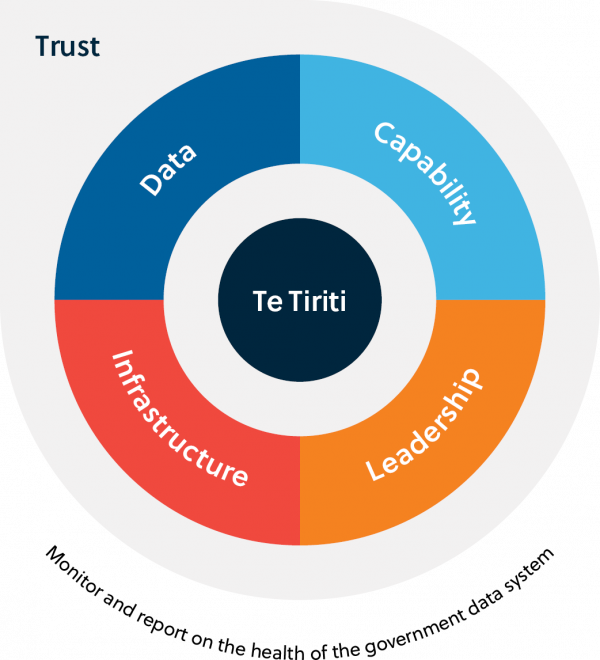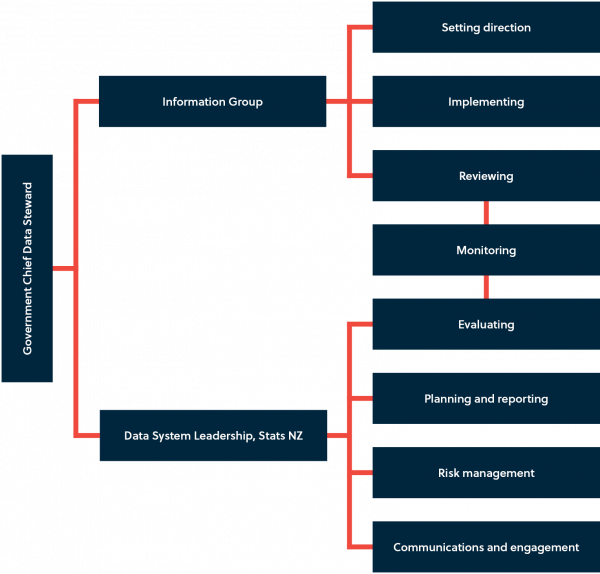This page lays out the refreshed system strategy for the government data system of Aotearoa NZ. The strategy was published as part of the Government Data Strategy and Roadmap 2021.
On this page
The refreshed Government Data Strategy and Roadmap is designed to create an inclusive and integrated data system that supports innovation safely.
An inclusive data system means anyone who wants to access data to inform decision-making can do so in a way that works for them. Inclusivity ensures that the people of Aotearoa New Zealand see themselves reflected in the data the system produces.
An integrated data system creates maximum insight with minimum burden for providers of data. Standards, guidance and protocols ensure data can be found, managed, shared, combined, and re-used. An integrated data system means data can be shared easily while also protecting privacy, security, and confidentiality.
The activities prioritised by the Government Data Strategy and Roadmap will give effect to the following objectives:
The strategy has four focus areas. Each focus area has a set of outcomes. These outcomes provide an accountability mechanism for ensuring the government meets the goals required to implement the strategy effectively. All of the activity outlined in the strategy and roadmap is underpinned by a responsibility to uphold Te Tiriti and a commitment to maintaining and enhancing public trust and confidence.

The data focus area is about making sure the right data is available and able to be accessed, used and re-used across government.
The capability focus area is about developing capabilities and skills within our people to create, collect, manage, and use data across government.
The leadership focus area is about ensuring that clear rules and system settings are in place and are well understood.
The infrastructure focus area is about building the infrastructure that enables effective data management and reuse.
The underpinning element of Te Tiriti is about working together with iwi and Māori partners to fulfil crown responsibilities to Te Tiriti through support of Māori and iwi data needs.
The underpinning element of Trust is about making sure people can trust the data they share with government will be collected, managed, and used safely, and responsibly.
There are five principles that frame how we will work to implement the strategy for the government data system. The principles are adapted from the Data Protection and Use Policy, the Mana Ōrite Relationship Agreement between Stats NZ and the Data Iwi Leaders Group, and the Public Service Act.
Respect and uphold the mana and dignity of the people, whānau, communities and groups who share their data and information.
Empower people by giving them a choice and enabling their access to, and the use of, their data and information
A shared culture of respect, guardianship, care and protection for data as a strategic and valued resource, recognising that for some Māori, Māori data is a taonga and iwi-Māori are kaitiaki over their taonga.
Leadership that focuses on common purpose whilst also respecting the autonomy and independence of individuals, groups and agencies.
Strong transparent relationships through respect, integrity, empathy and commitment to the kaupapa.
The Information Group are the key governance body for the Government Data Strategy and Roadmap. They are responsible for setting, implementing, monitoring, and reviewing the progress made against the strategy.

If you'd like more information, have a question, or want to provide feedback, email datalead@stats.govt.nz.
Content last reviewed September 17 2021.